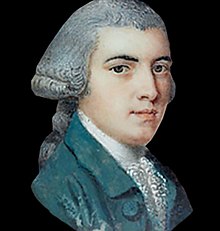
Back بنجامين هاريسون الخامس Arabic بنجامین هریسون پنجم AZB Benjamin Harrison V. Czech Benjamin Harrison V German بنیامین هریسون پنجم Persian Benjamin Harrison V French בנג'מין הריסון החמישי HE Benjamin Harrison V Italian ベンジャミン・ハリソン (5世) Japanese 벤저민 해리슨 5세 Korean
Benjamin Harrison V | |
|---|---|
 Miniature portrait, 18th century, unknown artist | |
| 5th Governor of Virginia | |
| In office December 1, 1781 – December 1, 1784 | |
| Preceded by | Thomas Nelson Jr. |
| Succeeded by | Patrick Henry |
| Speaker of the Virginia House of Delegates | |
| In office 1785–1786 | |
| Preceded by | John Tyler Sr. |
| Succeeded by | Joseph Prentis |
| In office May 7, 1781 – December 1, 1781 | |
| Preceded by | Richard Henry Lee |
| Succeeded by | John Tyler Sr. |
| In office May 4, 1778 – March 1, 1781 | |
| Preceded by | George Wythe |
| Succeeded by | Richard Henry Lee |
| Member of the Virginia House of Delegates from Charles City County | |
| In office May 5, 1777 – December 1, 1781 | |
| Preceded by | Samuel Harwood |
| Succeeded by | William Green Munford |
| Personal details | |
| Born | April 5, 1726 Charles City County, Colony of Virginia, British America |
| Died | April 24, 1791 (aged 65) Charles City County, Virginia, U.S. |
| Resting place | Berkeley Plantation, Charles City County, Virginia, U.S. |
| Spouse |
Elizabeth Bassett (m. 1748) |
| Children | 7, including Benjamin VI and William Henry |
| Parent(s) | Benjamin Harrison IV Anne Carter |
| Relatives | Harrison family of Virginia |
| Alma mater | College of William & Mary |
| Profession |
|
| Signature | |
Benjamin Harrison V (April 5, 1726 – April 24, 1791) was an American planter, merchant, and politician who served as a legislator in colonial Virginia, following his namesakes' tradition of public service. He was a signer of the Continental Association, as well as the United States Declaration of Independence, and was one of the nation's Founding Fathers. He served as Virginia's governor from 1781 to 1784.
He was born into the Harrison family of Virginia at their homestead, the Berkeley plantation. He served an aggregate of three decades in the Virginia House of Burgesses, alternately representing Surry County and Charles City County. Harrison was among the early patriots to formally protest measures that King George III and the British Parliament imposed upon the American colonies, leading to the American Revolution. Although a slaveholder, Harrison joined a 1772 petition to the king, requesting that he abolish the slave trade.
As a delegate to the Continental Congress and chair of its Committee of the whole, Harrison attended and presided over the final debate of the Declaration of Independence. He was one of its signers in 1776. The Declaration included a foundational philosophy of the United States: "We hold these truths to be self-evident, that all men are created equal, that they are endowed by their Creator with certain unalienable Rights, that among these are Life, Liberty and the pursuit of Happiness."
Harrison was elected as Virginia's fifth governor; his administration was marked by its futile struggle with a state treasury decimated by the Revolutionary War. He later returned to the Virginia House for two final terms. In disagreement with his traditional ally George Washington, Harrison, in 1788, cast one of his last votes in opposition to the nation's Constitution for its lack of a bill of rights. He left two descendants who became United States presidents—son William Henry Harrison and great-grandson Benjamin Harrison.